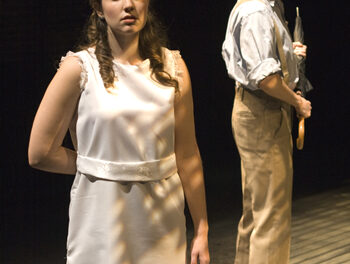The North Carolina Symphony‘s Summerfest series presents delightful outdoor concerts in the pristine Koka Booth Amphitheatre every summer, and the two Mozart festival concerts on June 20 and 21 were perhaps the highlight of this season. Summer concert series tend to veer toward popular attractions, conducive to a refreshing picnic, a smooth bottle of wine, and sturdy but aged lawn chairs. The Mozart Festival II, concluding the two-concert Mozart series, provided a cerebral, rarified spirit for this venerable summer tradition – a spirit which held the audience in rapt attention.
The concert on Saturday presented three late, dense works of Mozart, a composer popularized in film and in our culture as a sort of idiot savant who, by means of a profligate life, met an early death. While reading Mozart’s letters and modern biographies dispels these myths – he appears at once mature, humorous, and responsible through these lenses – and hearing three of the composer’s greatest works brings his tangled genius to the fore. The program began with the overture to Die Zauberflöte (The Magic Flute), K.620, Mozart’s comic singspiel replete with famous melodies and Masonic imagery. Mozart almost always composed his overtures after the entire operas were written, and in some cases only hours before the first rehearsal; his haste never diminished the music’s beauty, however. Unfortunately, the orchestra faced tuning and timing issues all night; some of the fugato entrances were off-kilter, and the winds had trouble staying in tune, perhaps because of the humid climate. Andrew Lowy, the principal clarinetist for the Symphony, performed as soloist in the Concerto for Clarinet and Orchestra, K.622, to conclude the program’s first half. The youthful Lowy was in command throughout the concerto, and he played with a hearty translucence and suppleness which helps remind us why Mozart was so enamored with the clarinet. Particularly beautiful was the second movement, in which Lowy highlighted Mozart’s quiet magic at the movement’s end.
The program’s finale, the “Jupiter” Symphony in C Major, K.551, has received nearly every musical and artistic superlative since the late 18th century. The rich symphony, in part the outcome of Mozart’s study of Bach, even makes the list of Woody Allen’s reasons life is worth living in Manhattan (for an excerpt from which, click here). From the start, however, the orchestra faced tuning problems, especially in the upper strings. Courtney Lewis, the evening’s conductor, commanded the music with intelligence and precision, but the orchestra did not heed well. Still, the performance was passable, and the majestic fourth movement shimmered in the hot summer evening with its dense fugal textures. The audience, often talkative during these outdoor performances, responded with a hushed reverence throughout this program (despite clapping-between movements, which is more of a modern taboo anyway), and gratefully accepted the gift of Mozart’s mastery on this June evening.
Summerfest continues in Cary. For details, see our calendar.











